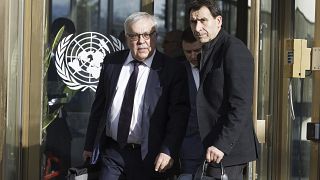Interview
The cost of food has gone up significantly since the beginning of the year, leaving many people in developing countries not just hungrier, but also poorer.
High energy prices, a pandemic, and the war in Ukraine, which has made it harder for countries to import grains, have combined to create a food crisis on a huge scale.
In many countries, the failure of seasonal rains has also meant that there's less food to eat or sell.
Boaz Keizire is the head of policy and advocacy of the Alliance for a Green Revolution in Africa, an organization that promotes better farming strategies for Africa.
He recently sat down with Africanews to discuss the sustainable approaches needed to end recurrent food crises on the continent.
Africanews: Are you concerned about potential social unrest breaking out in Africa as a result of rising food prices?
Keizire: Thank you for having me, Ronald. I am concerned as a person but also the continent is concerned. Currently, we are witnessing the largest cost of living crisis of this 21st century to date, and the people's capacity to cope is actually decreasing. The clock is ticking and we do not have enough time to really wait.
But there's still some bit of period where we can actually begin to see the cost of living addressed and all the human suffering that it is bringing. In fact, FAO is estimating that almost up to 83% of the poor household income is spent on food. So that means if there are changes in prices, if there are increases in the cost of living, this is potentially likely to morph into social unrest and that creates some political challenges as well.
Africanews: African governments, Boaz aren't exactly just sitting back. What are they doing now to bring down the rising cost of food? What interventions are they undertaking?
Keizire: So they are putting in place some policy incentives to create efficiency in the supply chains, for example. They are also trying to put in place subsidies for agriculture, seed, and fertilizer to make sure that production increases. Those are some of the efforts.
They are also deliberately working on protecting the consumers by establishing stimulus packages and also strengthening social safety nets to make sure that the governments are able to respond and cope with the shock.
And, one of the other key things that we are witnessing on the continent and what some of the leaders are doing is strengthening their strategic food reserves. Ideally to stabilize supplies as well as prices and support domestic approaches.
Africanews: The world is excited about, for example, the grain export deal between Russia and Ukraine, but this is only short-term. How would you address the deep-seated, structural issues that are to blame for food crises in many developing countries?
Keizire: The recent UN food systems summit has taught us that leaders need to do more and to scale up investments in areas such as climate adaptation, conservation farming or regenerative agriculture.
Ideally to enhance productivity without disrupting the environment. The crisis in Ukraine is just not the first crisis. Before it, we had the climate change crisis and the locust invasion in Africa. Then there were oil and gas price increases even before the Ukraine crisis. All these have exacerbated the challenge on the continent.
This year's African Green Revolution Forum which is going to take place in Kigali, Rwanda, is a huge opportunity for governments and business leaders to discuss and agree on some of the solutions. They need to accelerate trade across the region, especially the implementation of intra-African trade. Because only then will we be able to see where you can get food from deficit areas to surplus areas.
We are seeing fertilizer being produced in Nigeria by Dangote, but getting into markets in Europe and the rest of the world, rather than reaching the poorer households in Africa simply because of structural constraints. Leaders must act on some of those challenges to be able to strengthen trade within the region.
Africanews: Boaz, you have worked at the African Union and in fact, this year is the year of nutrition in Africa. What, according to the A.U., are the biggest threats to African food and nutrition security, and what are they doing about it?
Keizire: I would summarize the challenges that are rooted in the continent as the inability to have a strong capacity to respond. Africa's biggest challenge is not money. The biggest challenge is a lack of coordination. It is a lack of the right investments to deliver on the programs that we already have. There is a lot of money within the ecosystem. The food systems are challenged simply because of a lack of stronger commitments.
And I think leaders need to do more than what they are doing today because business as usual is not going to get us where we need to be.
Africanews: Boaz Keizire, thank you very much for your time.
Keizire: Welcome. Thank you for having me.











Go to video
AU names Burundian president special envoy for Sahel region
11:19
Cocoa is under pressure while East African economy is on the rise {Business Africa}
01:00
Russia launches 400 drones overnight in latest attacks on Ukraine
02:30
Morocco’s oases struggle to survive amid growing desertification
01:07
Trump threatens Russia with tariffs if no Ukraine peace deal reached within 50 days
11:17
Bridging the legal gap in Africa’s digital boom {Business Africa}